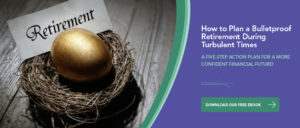Could a Roth Conversion Ease Your Tax Bite?
Minimizing the amount you pay in taxes is essential for weathering market downturns. However, the complexity of the U.S. tax code often makes it difficult to plan effective tax strategies on your own. This is why affluent taxpayers sometimes assume that their best option is simply to pay whatever they owe each year.
Many of them have no idea how much money they could potentially save by planning financially to lower their tax liability. One strategy worth considering, for instance, is a Roth Conversion. This financial decision may reduce your future taxable income while diversifying your financial portfolio (a possible bonus for investors).
This blog surveys the following topics:
- Capital gains taxes are going up in 2023
- A backdoor Roth conversion might help.
- Earlier starts can potentially save more
- Take it from an AIF®: It’s worth the time
Capital Gains Taxes Are Going Up in 2023
The Biden administration has proposed to increase the capital gains tax rate for high-income earners from 20% to 39.6%, which is the same as the top income tax rate. Additionally, the current 3.8% net investment income tax would jump to 5% as a result of the proposal.
While the proposed increases would generate additional revenue for the government, they could potentially endanger investors’ nest eggs by reducing the after-tax returns on investments. This, in turn, could lead to a decrease in investors’ activity, particularly among high-income earners who are subject to the higher tax rate.
At the same time, higher capital gains taxes could also discourage long-term investment by making investors more likely to sell their assets in the short term to avoid higher tax rates. This, as well, could negatively impact U.S. economic growth and stability because long-term investment is crucial for businesses to expand and create jobs.
Is Your Retirement Plan Ready to Weather a Recession? We Have Insights to Help, Here.
A Backdoor Roth Conversion Might Help.
Let’s talk about traditional IRAs and 401(k)s. These retirement accounts allow you to contribute pre-tax dollars, meaning that you don’t pay taxes on the money you put in. Instead, you’re taxed when you withdraw it in retirement.
With a Roth IRA, on the other hand, you contribute after-tax dollars. This means that you don’t get the tax break when you contribute, but you also don’t have to pay taxes on the money you withdraw later. This can be a huge advantage, especially if you expect your tax rate to be the same or higher in retirement than it is today.
So, why consider a Roth conversion? Here are a few reasons:
- Potential tax-free growth. Once your money is in a Roth IRA, it can grow tax-free. This means that you don’t have to pay taxes on any investment gains or dividends your account earns. Over time, this can make a significant difference in the amount of money generated for your retirement plan.
- Lower future tax liability. If you expect your tax rate to be higher or the same in retirement than right now, a Roth conversion can help you avoid paying taxes on a larger amount of money in the future. By paying taxes on what you convert now, you can potentially reduce your overall tax liability.
- Flexibility in retirement. Unlike traditional IRAs and 401(k)s, Roth IRAs don’t require you to start taking withdrawals at a certain age. This means you can let your money continue to grow tax-free for as long as you want. It also means more flexibility in how you use your retirement funds since you can withdraw money without worrying about triggering taxes.
Particularly as the economy enters a likely recession in 2023 or 2024, you may want to optimize your financial plans further by leveraging a backdoor Roth conversion. This strategy allows the benefits, even if your income exceeds the limit for contributions to a Roth.
Traditional Roth IRA contributions are restricted by income limits. So, high-income earners may not be able to contribute as much toward their retirement savings as they’d prefer. However, we can contribute to a traditional IRA and then convert it to a Roth IRA. This process is the “backdoor” Roth conversion.
One of the primary advantages during a recession is the resulting tax benefits. Since the value of investments sometimes decreases, we can utilize the opportunity to convert traditional IRA funds to a Roth IRA at a lower-than-usual tax rate. Taxes are based on the value of the IRA at the time of the conversion, so a lower value means lower taxes.
Another advantage of backdoor Roth conversions during a recession is the potential future tax savings. Roth IRAs are funded with after-tax dollars, meaning that your withdrawals during a high-net-worth retirement are tax-free. As recessionary tax rates often increase, the advantage becomes clear.
Unlike traditional IRAs, Roth IRAs do not have required minimum distributions (RMDs), either. This means that investors can choose when and how much to withdraw from their Roth IRA, providing flexibility in retirement. During a recession, this flexibility can be particularly beneficial as investors may need to adjust their retirement plans.
Earlier Starts Can Potentially Save More
By starting the process early and then completing it ahead of a recession, we may potentially save you a significant amount of money. Once the big downturn hits, the stock market tends to experience a significant decline. The value of investments in portfolios can decline as a result.
That’s why a proactive backdoor Roth conversion could potentially save money by allowing your investments to grow tax-free and take advantage of current tax rates in the meantime.
If we strategize it, you can still retire with confidence in Woodbridge or Connecticut or the location of your choosing. However, it’s important for a financial planner to weigh the potential benefits and drawbacks of this strategy for your unique circumstances. So, review your circumstances with a professional before proceeding.
Take It From an AIF®: It’s Worth the Time
 If we haven’t met yet, hello: I’m Paul Schatz, President of Heritage Capital and an Accredited Investment Fiduciary® (AIF®). Our insights don’t come as trendy, cookie-cutter solutions. They are the result of 34 years of experience in the financial industry.
If we haven’t met yet, hello: I’m Paul Schatz, President of Heritage Capital and an Accredited Investment Fiduciary® (AIF®). Our insights don’t come as trendy, cookie-cutter solutions. They are the result of 34 years of experience in the financial industry.
We specialize in helping high-net-worth individuals (HNWI) and families pursue solid strategies for mitigating taxes, retiring comfortably, growing nest eggs, estate planning, and keeping assets market-weather-ready. To learn more about our approach to wealth management, contact us or schedule a complimentary meeting.


